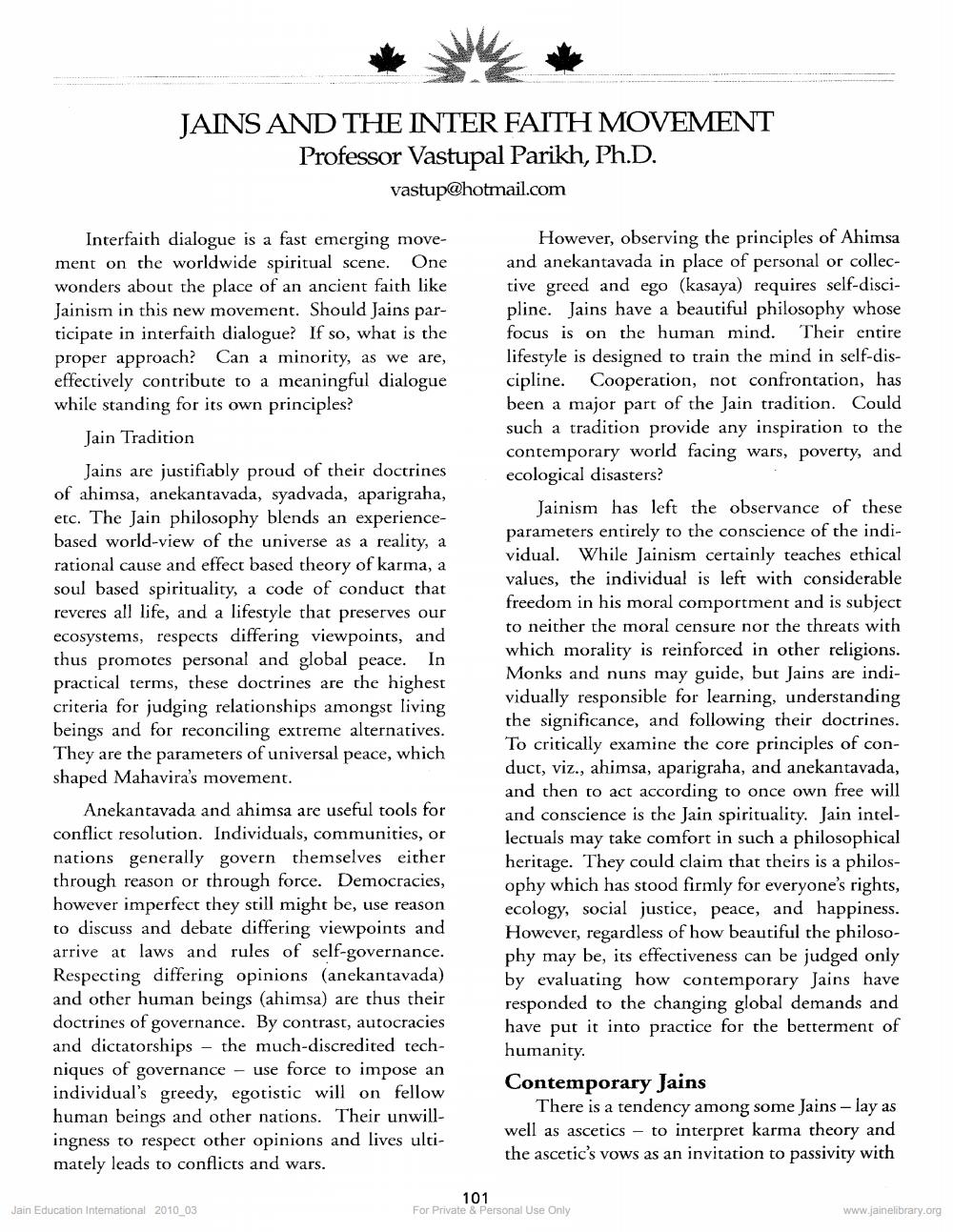________________
JAINS AND THE INTER FAITH MOVEMENT
Professor Vastupal Parikh, Ph.D.
[email protected]
Interfaith dialogue is a fast emerging movement on the worldwide spiritual scene. One wonders about the place of an ancient faith like Jainism in this new movement. Should Jains participate in interfaith dialogue? If so, what is the proper approach? Can a minority, as we are, effectively contribute to a meaningful dialogue while standing for its own principles?
Jain Tradition
Jains are justifiably proud of their doctrines of ahimsa, anekantavada, syadvada, aparigraha, etc. The Jain philosophy blends an experiencebased world-view of the universe as a reality, a rational cause and effect based theory of karma, a soul based spirituality, a code of conduct that reveres all life, and a lifestyle that preserves our ecosystems, respects differing viewpoints, and thus promotes personal and global peace. In practical terms, these doctrines are the highest criteria for judging relationships amongst living beings and for reconciling extreme alternatives. They are the parameters of universal peace, which shaped Mahavira's movement.
Anekantavada and ahimsa are useful tools for conflict resolution. Individuals, communities, or nations generally govern themselves either through reason or through force. Democracies, however imperfect they still might be, use reason to discuss and debate differing viewpoints and arrive at laws and rules of self-governance. Respecting differing opinions (anekantavada) and other human beings (ahimsa) are thus their doctrines of governance. By contrast, autocracies and dictatorships - the much-discredited techniques of governance - use force to impose an individual's greedy, egotistic will on fellow human beings and other nations. Their unwillingness to respect other opinions and lives ultimately leads to conflicts and wars.
However, observing the principles of Ahimsa and anekantavada in place of personal or collective greed and ego (kasaya) requires self-discipline. Jains have a beautiful philosophy whose focus is on the human mind. Their entire lifestyle is designed to train the mind in self-discipline. Cooperation, not confrontation, has been a major part of the Jain tradition. Could such a tradition provide any inspiration to the contemporary world facing wars, poverty, and ecological disasters?
Jainism has left the observance of these parameters entirely to the conscience of the individual. While Jainism certainly teaches ethical values, the individual is left with considerable freedom in his moral comportment and is subject to neither the moral censure nor the threats with which morality is reinforced in other religions. Monks and nuns may guide, but Jains are individually responsible for learning, understanding the significance, and following their doctrines. To critically examine the core principles of conduct, viz., ahimsa, aparigraha, and anekantavada, and then to act according to once own free will and conscience is the Jain spirituality. Jain intellectuals may take comfort in such a philosophical heritage. They could claim that theirs is a philosophy which has stood firmly for everyone's rights, ecology, social justice, peace, and happiness. However, regardless of how beautiful the philosophy may be, its effectiveness can be judged only by evaluating how contemporary Jains have responded to the changing global demands and have put it into practice for the betterment of humanity. Contemporary Jains
There is a tendency among some Jains - lay as well as ascetics – to interpret karma theory and the ascetic's vows as an invitation to passivity with
Jain Education Interational 2010_03
101 For Private & Personal Use Only
www.jainelibrary.org
